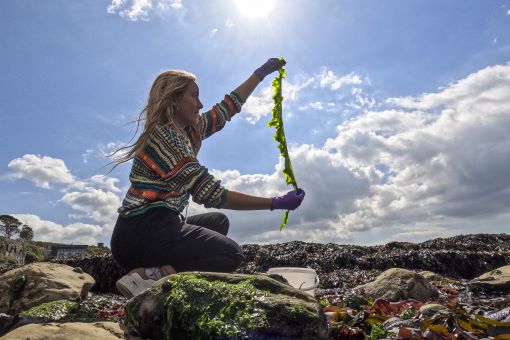Travel grants
The latest recipients of RSB travel grants report back on how they used the funding
ANNELIESE HODGE MRSB, PLYMOUTH MARINE LABORATORY AND THE UNIVERSITY OF PLYMOUTH

Society of Environmental Toxicology and Chemistry (SETAC) Annual Europe Meeting, Vienna, Austria, May 2025
At the SETAC annual meeting I presented my research on the ecotoxicological effects of the sunscreen-derived ultraviolet filters oxybenzone and nano titanium dioxide on marine microalgae. This stimulated conversations with other researchers in this field and new connections, and provided me with an opportunity to learn more about other international work in the field.
I co-chaired a session called ‘Sunscreens and personal care products in the environment: new data and approaches to evaluate environmental risks and possible solutions’, which enabled me to gain experience of the organisational elements of a conference.
I was also tasked with screening abstracts that were submitted to our session and select which would be shown.
SETAC is a space for passionate professionals, all working towards the same goal of improving the health of the environment and ourselves. This experience was invaluable, particularly through my involvement as a session organiser for this meeting.
MIRANDA NEL, THE ROSLIN INSTITUTE, UNIVERSITY OF EDINBURGH

Microbiology Society Annual Conference 2025, Liverpool, March/April 2025
This conference celebrated the diversity of research on fundamental biology and the impacts of microbes. It consisted of a mixture of prize lectures, research and careers talks, poster sessions, networking and lively discussions. I was excited to give my first ever conference talk, ‘Virus forum: innate immunity’, presenting work from my MSc. Several academics had more questions for me after my Q&A. These discussions were thought provoking and opened up avenues for possible future research collaborations.
The experience was hugely valuable, and really opened my eyes to the wealth of different strategies biologists are using to tackle current and future global challenges.
ANNELISE GARRISON, ASTON UNIVERSITY

Gordon Research Conference on Tissue Repair and Regeneration, Colby-Sawyer College, New London, US, May/June 2025
The conference is a leading international forum for scientists investigating the mechanisms of tissue repair and regenerative biology. The 2025 theme, ‘Recreating Tissue Complexity’, closely aligned with my PhD research on cellular responses to fibrotic stimuli in 3D cell culture models.
I presented a poster on my research, which explores how pericytes respond to fibrotic signalling in both 2D and 3D environments, with the goal of understanding mechanisms that contribute to tissue scarring and impaired regeneration. The poster generated significant interest, and I received valuable feedback on my methods and data.
My trip was instrumental in expanding my scientific network, and inspiring new ideas for data analysis and model development. It also offered new insights into career possibilities, and the discussions I had broadened my perspectives on how biological research can be applied across disciplines. I would also like to thank the Midlands Integrative Biosciences Training Partnership, which also funded this trip.
ANNA-MARIE MUIR, UNIVERSITY OF SOUTHAMPTON

Association for Research in Vision and Ophthalmology (ARVO), Salt Lake City, Utah, US, May 2025
In May I was fortunate to attend my first ARVO annual conference, exploring the breadth of ophthalmology and vision sciences. I’m in the final year of my PhD and, coming home with a wallet full of business cards and some helpful advice, I feel much more prepared for what comes next.
My poster on diet and retinal pathology was selected as a ‘hot topic’, and I gained valuable insights and encouragement from other scientists. By attending lipid biology and metabolism-related sessions, I gained a wider understanding of the pathological processes of the retina.
Attending ARVO enabled me to see the full scope of current ophthalmology and vision science research, and has emboldened me as an early-career scientist. I would like to thank the RSB and my supervisor, Dr Arjuna Ratnayaka, for accompanying me.
Compiled by Emma Chaplin and The Biologist editorial team.


